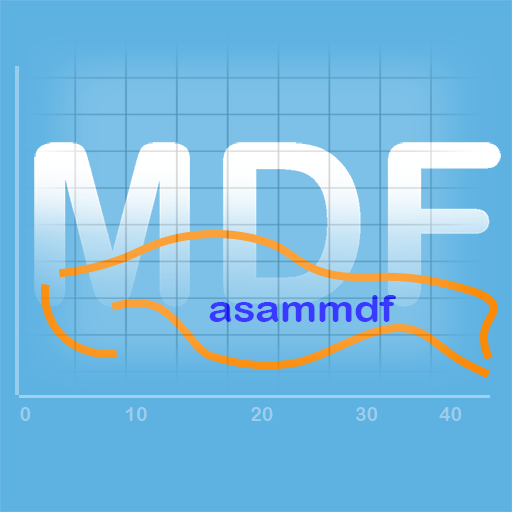asammdf is a fast parser and editor for ASAM (Associtation for Standardisation of Automation and Measuring Systems) MDF (Measurement Data Format) files.
asammdf supports MDF versions 2 (.dat), 3 (.mdf) and 4 (.mf4).
asammdf works on Python >= 3.6 (for Python 2.7, 3.4 and 3.5 see the 4.x.y releases)
| ! | Travis CI | Appveyor | CoverAlls | Codacy | ReadTheDocs |
|---|---|---|---|---|---|
| master |
| PyPI | conda-forge |
|---|---|
The main goals for this library are:
- to be faster than the other Python based mdf libraries
- to have clean and easy to understand code base
- to have minimal 3-rd party dependencies
-
create new mdf files from scratch
-
append new channels
-
read unsorted MDF v3 and v4 files
-
read CAN bus logging files
-
extract CAN signals from anonymous CAN bus logging measurements
-
filter a subset of channels from original mdf file
-
cut measurement to specified time interval
-
convert to different mdf version
-
export to HDF5, Matlab (v4, v5 and v7.3), CSV and parquet
-
merge multiple files sharing the same internal structure
-
read and save mdf version 4.10 files containing zipped data blocks
-
space optimizations for saved files (no duplicated blocks)
-
split large data blocks (configurable size) for mdf version 4
-
full support (read, append, save) for the following map types (multidimensional array channels):
-
mdf version 3 channels with CDBLOCK
-
mdf version 4 structure channel composition
-
mdf version 4 channel arrays with CNTemplate storage and one of the array types:
- 0 - array
- 1 - scaling axis
- 2 - look-up
-
-
add and extract attachments for mdf version 4
-
handle large files (for example merging two fileas, each with 14000 channels and 5GB size, on a RaspberryPi)
-
extract channel data, master channel and extra channel information as Signal objects for unified operations with v3 and v4 files
-
time domain operation using the Signal class
- Pandas data frames are good if all the channels have the same time based
- a measurement will usually have channels from different sources at different rates
- the Signal class facilitates operations with such channels
-
graphical interface to visualize channels and perform operations with the files
-
for version 3
- functionality related to sample reduction block: the samples reduction blocks are simply ignored
-
for version 4
- experiemental support for MDF v4.20 column oriented storage
- functionality related to sample reduction block: the samples reduction blocks are simply ignored
- handling of channel hierarchy: channel hierarchy is ignored
- full handling of bus logging measurements: currently only CAN bus logging is implemented with the ability to get signals defined in the attached CAN database (.arxml or .dbc). Signals can also be extracted from an anonymous CAN logging measurement by providing a CAN database (.dbc or .arxml)
- handling of unfinished measurements (mdf 4): warnings are logged based on the unfinished status flags but no further steps are taken to sanitize the measurement
- full support for remaining mdf 4 channel arrays types
- xml schema for MDBLOCK: most metadata stored in the comment blocks will not be available
- full handling of event blocks: events are transfered to the new files (in case of calling methods that return new MDF objects) but no new events can be created
- channels with default X axis: the defaukt X axis is ignored and the channel group's master channel is used
from asammdf import MDF
mdf = MDF('sample.mdf')
speed = mdf.get('WheelSpeed')
speed.plot()
important_signals = ['WheelSpeed', 'VehicleSpeed', 'VehicleAcceleration']
# get short measurement with a subset of channels from 10s to 12s
short = mdf.filter(important_signals).cut(start=10, stop=12)
# convert to version 4.10 and save to disk
short.convert('4.10').save('important signals.mf4')
# plot some channels from a huge file
efficient = MDF('huge.mf4')
for signal in efficient.select(['Sensor1', 'Voltage3']):
signal.plot()Check the examples folder for extended usage demo, or the documentation http://asammdf.readthedocs.io/en/master/examples.html
https://canlogger.csselectronics.com/canedge-getting-started/log-file-tools/asammdf-api/
http://asammdf.readthedocs.io/en/master
And a nicely written tutorial on the CSS Electronics site
Please have a look over the contributing guidelines
If you enjoy this library please consider making a donation to the numpy project.
Thanks to all who contributed with commits to asammdf:
- Julien Grave JulienGrv
- Jed Frey jed-frey
- Mihai yahym
- Jack Weinstein jackjweinstein
- Isuru Fernando isuruf
- Felix Kohlgrüber fkohlgrueber
- Stanislav Frolov stanifrolov
- Thomas Kastl kasuteru
- venden venden
- Marat K. kopytjuk
- freakatzz freakatzz
- Martin Falch MartinF
- dxpke dxpke
- Nick James driftregion
asammdf is available on
- github: https://github.com/danielhrisca/asammdf/
- PyPI: https://pypi.org/project/asammdf/
- conda-forge: https://anaconda.org/conda-forge/asammdf
pip install asammdf
# for the GUI
pip install asammdf[gui]
# or for anaconda
conda install -c conda-forge asammdfasammdf uses the following libraries
- numpy : the heart that makes all tick
- numexpr : for algebraic and rational channel conversions
- wheel : for installation in virtual environments
- pandas : for DataFrame export
- canmatrix : to handle CAN bus logging measurements
- natsort
- cChardet : to detect non-standard unicode encodings
- lxml : for canmatrix arxml support
- lz4 : to speed up the disk IO peformance
optional dependencies needed for exports
- h5py : for HDF5 export
- scipy : for Matlab v4 and v5 .mat export
- hdf5storage : for Matlab v7.3 .mat export
- fastparquet : for parquet export
other optional dependencies
- PyQt5 : for GUI tool
- pyqtgraph : for GUI tool and Signal plotting (preferably the latest develop branch code)
- matplotlib : as fallback for Signal plotting

